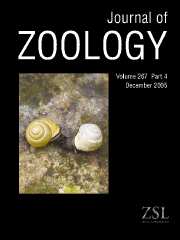Crossref Citations
This article has been cited by the following publications. This list is generated based on data provided by
Crossref.
MACA-MEYER, N.
CARRANZA, S.
RANDO, J. C.
ARNOLD, E. N.
and
CABRERA, V. M.
2003.
Status and relationships of the extinct giant Canary Island lizard Gallotia goliath (Reptilia: Lacertidae), assessed using ancient mtDNA from its mummified remains.
Biological Journal of the Linnean Society,
Vol. 80,
Issue. 4,
p.
659.
Carranza, S.
Arnold, E. N.
and
Amat, F.
2004.
DNA phylogeny ofLacerta(Iberolacerta) and other lacertine lizards (Reptilia: Lacertidae): Did competition cause long‐term mountain restriction?.
Systematics and Biodiversity,
Vol. 2,
Issue. 1,
p.
57.
Martin, Juan E.
and
Roca, Vicente
2004.
HELMINTH INFRACOMMUNITIES OF GALLOTIA CAESARIS CAESARIS AND GALLOTIA CAESARIS GOMERAE (SAURIA: LACERTIDAE) FROM THE CANARY ISLANDS (EASTERN ATLANTIC).
Journal of Parasitology,
Vol. 90,
Issue. 2,
p.
266.
Martin, J.E.
and
Roca, V.
2004.
Helminth infracommunities of a population of the Gran Canaria giant lizard Gallotia stehlini.
Journal of Helminthology,
Vol. 78,
Issue. 4,
p.
319.
2005.
Dynamic Food Webs.
p.
471.
Harmon, Luke J.
and
Gibson, Richard
2006.
MULTIVARIATE PHENOTYPIC EVOLUTION AMONG ISLAND AND MAINLAND POPULATIONS OF THE ORNATE DAY GECKO, PHELSUMA ORNATA.
Evolution,
Vol. 60,
Issue. 12,
p.
2622.
Carranza, S.
Harris, D. J.
Arnold, E. N.
Batista, V.
and
Gonzalez de la Vega, J. P.
2006.
Phylogeography of the lacertid lizard, Psammodromus algirus, in Iberia and across the Strait of Gibraltar.
Journal of Biogeography,
Vol. 33,
Issue. 7,
p.
1279.
Harmon, LukeJ.
and
Gibson, Richard
2006.
MULTIVARIATE PHENOTYPIC EVOLUTION AMONG ISLAND AND MAINLAND POPULATIONS OF THE ORNATE DAY GECKO, PHELSUMA ORNATA.
Evolution,
Vol. 60,
Issue. 12,
p.
2622.
Nance, Holly A.
2007.
Cranial osteology of the African gerrhosauridAngolosaurus skoogi(Squamata; Gerrhosauridae).
African Journal of Herpetology,
Vol. 56,
Issue. 1,
p.
39.
Cox, Siobhan C.
Carranza, Salvador
and
Brown, Richard P.
2010.
Divergence times and colonization of the Canary Islands by Gallotia lizards.
Molecular Phylogenetics and Evolution,
Vol. 56,
Issue. 2,
p.
747.
Raia, Pasquale
Guarino, Fabio M
Turano, Mimmo
Polese, Gianluca
Rippa, Daniela
Carotenuto, Francesco
Monti, Daria M
Cardi, Manuela
and
Fulgione, Domenico
2010.
The blue lizard spandrel and the island syndrome.
BMC Evolutionary Biology,
Vol. 10,
Issue. 1,
Blain, Hugues-Alexandre
Canudo, José-Ignacio
Cuenca-Bescós, Gloria
and
López-Martínez, Nieves
2010.
Amphibians and squamate reptiles from the latest Maastrichtian (Upper Cretaceous) of Blasi 2 (Huesca, Spain).
Cretaceous Research,
Vol. 31,
Issue. 4,
p.
433.
Jorge, Fátima
Roca, Vicente
Perera, Ana
Harris, D. James
and
Carretero, Miguel A.
2011.
A phylogenetic assessment of the colonisation patterns in Spauligodon atlanticus Astasio-Arbiza et al., 1987 (Nematoda: Oxyurida: Pharyngodonidae), a parasite of lizards of the genus Gallotia Boulenger: no simple answers.
Systematic Parasitology,
Vol. 80,
Issue. 1,
p.
53.
Frýdlová, Petra
and
Frynta, Daniel
2015.
Strong support for Rensch’s rule in an American clade of lizards (Teiidae and Gymnophtalmidae) and a paradox of the largest tejus.
The Science of Nature,
Vol. 102,
Issue. 5-6,
Monzón-Argüello, Catalina
Patiño-Martínez, Clara
Christiansen, Fredrik
Gallo-Barneto, Ramón
Cabrera-Pérez, Miguel Ángel
Peña-Estévez, Miguel Ángel
López-Jurado, Luis Felipe
and
Lee, Patricia L. M.
2015.
Snakes on an island: independent introductions have different potentials for invasion.
Conservation Genetics,
Vol. 16,
Issue. 5,
p.
1225.
Pérez-Méndez, Néstor
Jordano, Pedro
and
Valido, Alfredo
2015.
Downsized mutualisms: Consequences of seed dispersers’ body-size reduction for early plant recruitment.
Perspectives in Plant Ecology, Evolution and Systematics,
Vol. 17,
Issue. 2,
p.
151.
Martín, José
Martínez-Silvestre, Albert
López, Pilar
Ibáñez, Alejandro
Rodríguez-Domínguez, Miguel Ángel
and
Verdaguer, Isabel
2015.
Lipophilic compounds in femoral secretions of males and females of the El Hierro giant lizard Gallotia simonyi (Lacertidae).
Biochemical Systematics and Ecology,
Vol. 61,
Issue. ,
p.
286.
Mateo, José A.
and
Pleguezuelos, Juan M.
2015.
Cannibalism of an endemic island lizard (genus Gallotia ).
Zoologischer Anzeiger - A Journal of Comparative Zoology,
Vol. 259,
Issue. ,
p.
131.
Pérez-Méndez, Néstor
Jordano, Pedro
García, Cristina
and
Valido, Alfredo
2016.
The signatures of Anthropocene defaunation: cascading effects of the seed dispersal collapse.
Scientific Reports,
Vol. 6,
Issue. 1,
Palci, Alessandro
Lee, Michael S. Y.
and
Hutchinson, Mark N.
2016.
Patterns of postnatal ontogeny of the skull and lower jaw of snakes as revealed by micro‐CT scan data and three‐dimensional geometric morphometrics.
Journal of Anatomy,
Vol. 229,
Issue. 6,
p.
723.




